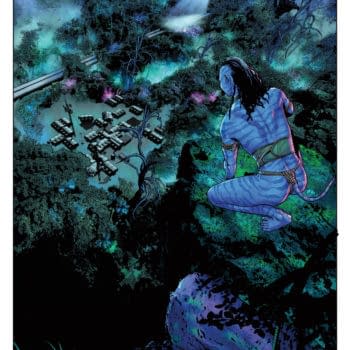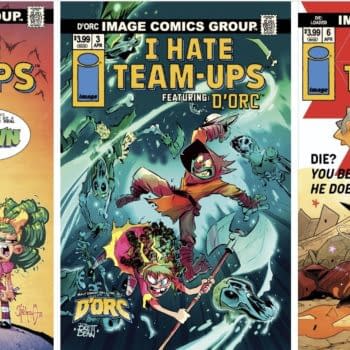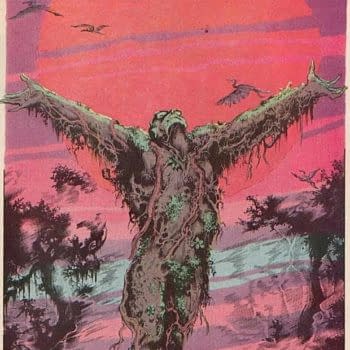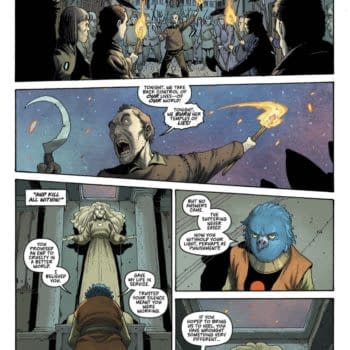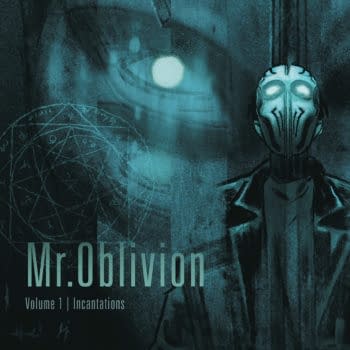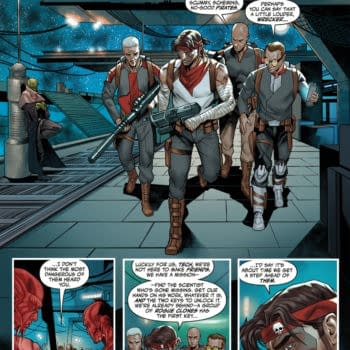Posted in: Comics, san diego comic con | Tagged: Brian Anderson, Charles "Zan" Christenson, Comics, Dan Parent, Dusty Jack, Elizabeth Watasin, entertainment, Grace Ellis, lgbt, P. Kristen Enos
LGBT Comics For Young Readers – The SDCC 2014 Panel
Joe Glass writes for Bleeding Cool:
Another day and another LGBT panel at Comic-Con International. P. Kristen Enos of PRISM comics leads again, this time with a panel including Brian Anderson (So Super Duper, The Advocate),Charles "Zan" Christenson (Northwest Press, The Power Within), Dusty Jack (Scuttlebutt Ink, Mahou Shounen Fight!), Grace Ellis (Lumberjanes), Robert Paul (Little Rainbow Comics), Dan Parent (Kevin Keller) and Elizabeth Watasin (Charm School).
Mahou Shounen Fight! plays on the magical girl genre by making them magical boys, the creators were big fans of the genre and manga and anime, it started by a desire to go against the grain of what was expected with a bright, colourful genre but centreing it around queer teen males, amongst a wide range of diverse characters, racially, gender, gender expression and sexuality.
One of the lead characters is a fabulous Indian character, who reads as gay but is engaged to marry a gender queer woman, and he himself is unconcerned with gender identity, a line the characters walk comfortably, which is refreshing rather than having it be a traumatic and painful experience. The Autumn spirit that he gets paired up with however is not so comfortable with the experience.
Lumberjanes is up next, discussing the breakout hit from Boom!. Ellis describes how the creative audience came together, as her co-writer tapped her to help her create an adventure series with all girl characters.
Very early on it is established that two of the girls are in a relationship, which they wanted to show as being really natural and not even a big thing, but they didn't want Lumberjanes to become 'the gay book', but a focus on a story about friends and bad ass girls.
When introducing the boys of the boys camp, they wanted to have it that if the girls are really bad ass in a traditionally masculine way, then they wanted the boys to be bad ass in a traditionally feminine way.
Anderson discusses his work, all self-published, and in the case of So Super Duper it came from an autobiographical element, as the lead character, despite being super flamboyant doesn't realise he's gay, which was an experience Anderson went through, not coming out until he was 26 years old, despite his fabulous flamboyancy and colourful nature. It came from being oblivious about yourself and having a fabulous hero in a traditionally masculine action hero setting.
Charm School comes from wanting to make an Archie or Sabrina type book that included a lesbian witch falling for a butch lesbian vampire, in a world filled with supernatural beings and hot rods. The series is now being collected and self-publishing, and Watasin promises she's finally going to do that last arc now.
Paul discusses Little Rainbow Comics, all online, with queer 1st Graders, the series is becoming a bit more topical of late, whilst still trying to maintain some innocence. Readership is very largely women, which was an unexpected by welcome demographic.
The Power Within, comic creator Zan discusses how when making a much more adult comic, the artist invited him to come along to try out a 24 hour comic challenge, and it was during the Fall of 2010 when the spate of LGBTQ teen suicides were becoming widely reported. They felt compelled to do something, and what they can do is comics, so they did a little version of the book and took it to events, and then pulled in a number of other creators including Parent and Gail Simone among many others, to help create an expanded version of the book. Dealing with a character in 8th Grade who faces incredible bullying who reaches a low point but decides not to give in.
Rainy Day Recess, his other book, formulated about the time, was about how can they make kids feel better and give them great stories. Looking at discussing tween problems like having a crush on your best friend all the way to having to move, it collects them all together to digest.
Parent on creating Kevin Keller in Archie (which led to applause), said they're working on a new Kevin storyline for next year. On the many celebrity appearances, Parents favorite was George Takei, who grew up reading Archie comics, who was thrilled to appear in the book. Parent points out it's nice to see Kevin no longer be 'the gay character', but is just now one of the gang.
The creators discuss how their stories that they create for young readers are created as these are the kinds of stories that they wish they had when growing up and going through those ages, and breaking down this idea that gay equals adult.
Ellis agrees that there is a need for this kind of thing, coming from writing for a website that is always discussing these kinds of issues, it's very much on her mind.
Zan says the best way is to make it something that they will grow into as well, that is honest and truthful. Anderson points out what they are all trying to achieve is making books that ANYONE can enjoy, no matter sexuality, age or gender.
A question from the audience but including stories of trans youth, especially trans youth who are not gay, lesbian or bisexual, but are in fact heterosexual, the answer to what needs to be done to adress that is to tell that story, if you don't see it, and you want it, make it. Given that many of the creators here were self-published you can see where that advice comes from.
They also say that it needs to be a case that the non-LGBT writers need to not be too scared to touch LGBT characters and issues, if they're afraid of getting it wrong or offending someone, then 'make a friend', share, learn and expand your experiences and education.
The best way for teachers to see if a book is okay to include in their school libraries, the best way is to read it yourself and assess it yourself, and prepare to fight for the importance to include it.
The panel agree that creating visibility will create acceptance, and writing from your heart is what is most important. Don't try to court controversy or a stunt, just be honest. And advice for wannabe artists and writers who want to get into these kinds of projects is just do it. Volunteering with companies like PRISM also is great.
Joe Glass is the creator and writer of LGBT superhero team series, The Pride, which is available on Comixology and at The Pride Store. He is also a co-writer of Welsh horror comedy Stiffs, which is now available on Comixology and the Stiffs Store.









